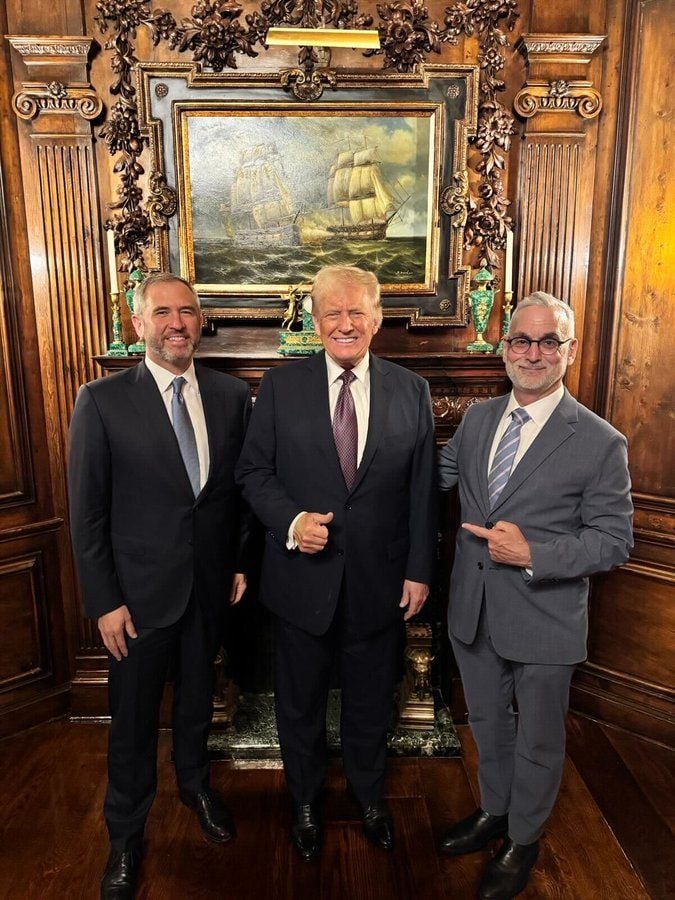







































Does Donald Trump Really Plan to Establish a U.S. Strategic Altcoin Reserve?
 DJT
DJT
 TRUMP
TRUMP
 GARY
GARY
 XRP
XRP
 TRUMP2024
TRUMP2024
US President-elect Donald could prioritize digital assets like Solana (SOL) and XRP as part of an American-first strategic reserve, according to a recent report from The New York Post.
As Trump prepares to take office for his second term, the crypto industry is on edge, wondering what his policies will mean for digital currencies. But is the president-elect truly open to creating a reserve for American cryptocurrencies, or is it just another rumor?
Trump’s Position on Cryptocurrencies
The cryptocurrency market has faced significant challenges in the past few years, particularly under the Biden administration, which has leaned heavily on enforcement actions through agencies like the U.S. Securities and Exchange Commission (SEC). However, with Trump set to return to the White House, many industry leaders are hopeful for a more favorable environment for digital assets.

Trump’s campaign pledges included creating a "crypto-friendly" environment, which many interpreted as a promise to build an infrastructure that would support cryptocurrency growth. These promises were bolstered by meetings with prominent figures in the crypto world, including Ripple CEO Brad Garlinghouse and chief legal officer Stuart Alderoty. This has led to speculation that Trump may indeed be receptive to building a strategic reserve for certain digital assets, notably Solana, XRP, and USD Coin.

What is the American-First Strategic Reserve?
According to reports from The New York Post, the idea of an American-first strategic reserve could focus on digital currencies that are based in the U.S. Solana, XRP, and USD Coin are some of the assets that could be included in this reserve. However, such a reserve would prioritize U.S.-based digital currencies, leaving Bitcoin — the largest cryptocurrency by market cap — out of the equation. This could be a controversial move, considering Bitcoin’s status as the global leader in the cryptocurrency space.
The idea of a national digital asset reserve has sparked mixed reactions within the industry. On one hand, it could support U.S.-based blockchain innovation and ensure the country maintains a competitive edge in the rapidly evolving digital economy. On the other hand, critics argue that such a move could sideline Bitcoin and delegitimize efforts to promote it as a decentralized, global store of value.
Speculation Around Ripple’s Involvement
Speculation about an altcoin reserve gained traction after Trump dined with Ripple executives, including Garlinghouse and Alderoty, in recent weeks. This meeting reportedly left Garlinghouse optimistic about Trump’s stance on cryptocurrency, which further fueled the idea that Ripple’s XRP could be a major player in this reserve.
However, some sources have downplayed these reports, suggesting that the rumors about Trump’s openness to an altcoin reserve could be a self-serving effort by Ripple Labs to promote their interests.
Industry insiders according to Unchained, speaking on the condition of anonymity, have suggested that the rumors surrounding XRP’s potential inclusion in a national reserve may be exaggerated. One source mentioned that XRP’s recent market surge could be linked to Ripple’s strong connections to Trump’s team rather than any official policy announcement.
The Future of Crypto Under Trump’s Administration
According to sources close to the situation, Trump’s presidency could usher in a new era for the cryptocurrency market. In addition to creating a strategic reserve, Trump’s agenda includes significant regulatory changes, such as dismissing SEC Chairman Gary Gensler, addressing concerns about "Operation Choke Point 2.0," and potentially repealing financial regulations that have been seen as stifling innovation.
Trump’s other promises related to the cryptocurrency space include the establishment of a Crypto Presidential Advisory Council, a push for the U.S. to become a bitcoin mining powerhouse, and efforts to repeal restrictive regulations like SAB 121. These changes would aim to streamline cryptocurrency adoption and boost the U.S. position as a leader in the global digital economy.

